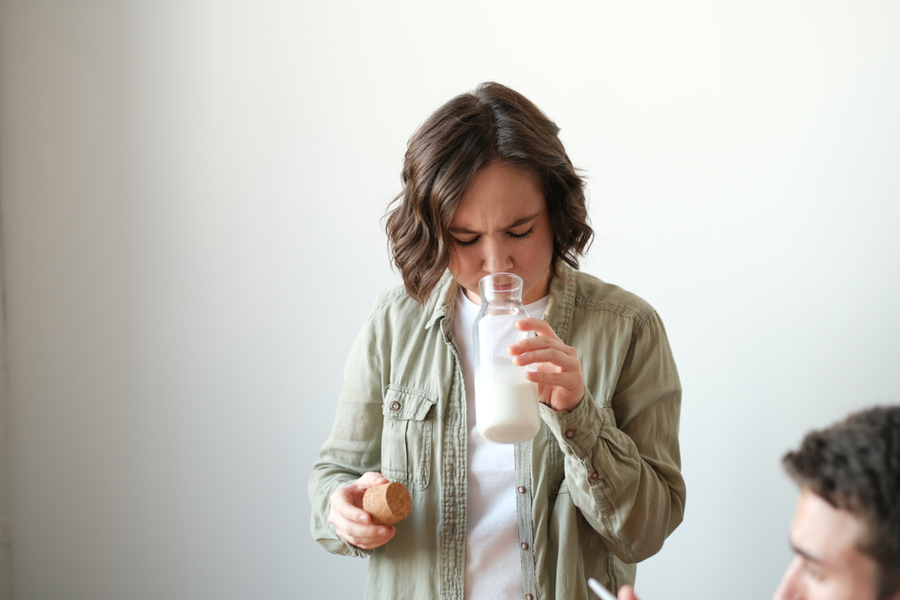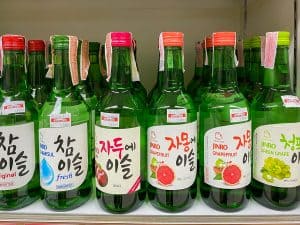
Despite the presence of plant-based milk long before the 21st century, it was not until recently that almond and other vegan milk rose to popularity.
The origin of these vegan milk varieties dates back to the 13th century, with almond milk as the pioneer among these.
That’s why; almond milk is a favorite for people worldwide and not just an alternative for people with dairy product allergies. The underlying reason is the nutty flavor with the thick texture of this milk, which makes you keep coming back for more.
Since this milk is plant-based, many people assume it may survive longer on the shelf, and even if it goes bad, it won’t have as many adverse effects as your regular dairy milk, which brings us to the question of what happens if you drink spoiled almond milk.
Food poisoning is one of the most frightening consequences of drinking spoiled almond milk. It can cause symptoms ranging from mild to harsh based on how spoiled the milk you had. Like your run-off-the-mill dairy milk, the results of drinking spoiled almond milk are diarrhea, vomiting, and an upset stomach.
Here, we will give you an insight into the signs of almond milk that has gone bad, why you shouldn’t drink it, and the shelf life of almond milk. So, stay tuned for an in-depth view of each aspect.
What Happens if You Drink Bad Almond Milk?

You can get similar symptoms from drinking spoiled almond milk as you would get from your dairy milk. That’s why drinking vegan milk that has long passed expiration isn’t in your best interest.
Following is the list of things that can happen if you do drink spoiled almond milk:
Food Poisoning
Food poisoning is one such consequence of ingesting spoiled almond milk. It may not seem such a big deal, but the cases can go from moderate to extreme. Also, in exceptional situations, it can even be life-threatening.
The excess growth of bacteria in the milk is the cause of milk going bad, which is why pasteurization is done to increase its shelf-life and prevent bacterial growth. It also helps hamper the extreme effect of food poisoning if you end up drinking spoiled milk.
However, it is best to visit the hospital if you have trouble staying hydrated.
Upset Stomach, Vomiting, and Diarrhea
The most common effects of drinking spoiled almond milk are upset stomach, vomiting, and diarrhea. Vomiting is a sign of rejection your body gives to foreign materials that may/may not be harmful to your body, so if you don’t notice the spoiled milk, it is another indication of bad almond milk.
These conditions are more frequent and take time to go away. Drinking plenty of water during these times is the best way to counter them and get back healthy quickly. It works like a charm, especially during diarrhea, as it can cause dehydration.
If you aren’t careful and suffer from other health conditions, ingesting spoiled milk can worsen it or even leave permanent damage.
Signs That Your Almond Milk Has Gone Bad

Your sense of smell, taste, and sight can help you identify whether your almond milk has spoiled. These indications start from your sense of sight, smell, and then taste.
Signs of spoiled almond milk are;
Appearance
Starting with the shape of the box, you can tell at a glance whether it has spoiled because if the box inflates after it is stored, it indicates that your almond milk has gone bad.
Shaking sealed drinks before consuming is a way to ensure that the mixture is homogeneous, but chunky milk, on the other hand, is a sign of spoiled milk. The velvety liquid may appear in chunks floating in your almond milk, but if they go away after a good shake, it is okay; otherwise, no.
Another thing to note on the appearance side is the mold in milk. Bacteria and fungi are the primary contributors to mold happening inside your milk. This black-colored mold isn’t good for your health if ingested, there is a differentiation between toxic and plain old black-colored mold, but mold in either form isn’t good.
Finally, the color of the milk is also a dead giveaway that your milk is no good anymore. There could be several reasons behind the discoloration of milk, but the most common one is oxidation.
Smell & Taste
On the other hand, your sense of smell and taste is a trusty way to tell if the milk has spoiled or not. Rancidity is a common sign in this case, as this type of milk has an acidic taste and smell. The pungent odor after opening the box will give you a clear-cut sign that you shouldn’t drink it.
But on the off chance you end up tasting it, the flavor of the milk won’t be what you are used to. It will have a slightly sour to fully sour taste based on how much it has spoiled; however, in either case, drinking it is no good.
Shelf-Life of Different Types of Almond Milk
The shelf-life of almond milk varies based on what type of packaging it comes in and what kind of milk it is, i.e., refrigerated, homemade, or Tetra Pak.
The Tetra Pak, or shelf-stable milk, has the biggest shelf-life, as it can last from six months to a year if stored properly. The second place is taken by refrigerated one, which can last up to ten days, and the last place is homemade milk, which can last for 2-5 days at most.
However, the shelf-life is significantly reduced if these products are opened, e.g., in the case of Tetra Paks, it can last 5-10 days in the fridge, for refrigerated ones, they can last for 3-5 days in the fridge, but the homemade plant-based milk has the same lifetime.
Conclusion
The primary reason behind the spoilage of milk is bacteria. But other factors, such as improper storage conditions, e.g., exposing it to air and sunlight, leaving it open, or not closing it tightly, etc., also play a role.
It doesn’t mean it goes bad right away; milk can stay okay for drinking even after the expiration date. However, you must ensure it doesn’t have mold, taste sour, chunky, or smell bad. If you see either of these signs, it is better to dispose of it immediately rather than ingest it.
The consequences of drinking spoiled milk can range from an upset stomach to severe food poisoning. Some other common adverse effects include vomiting and diarrhea.









